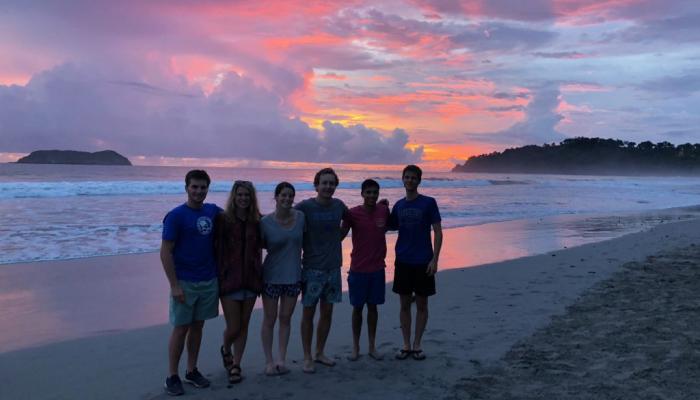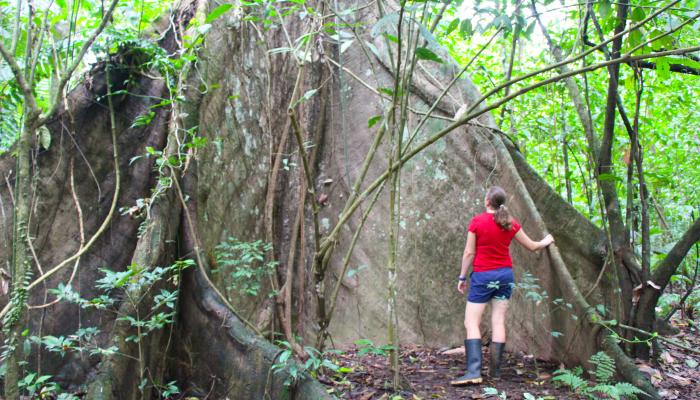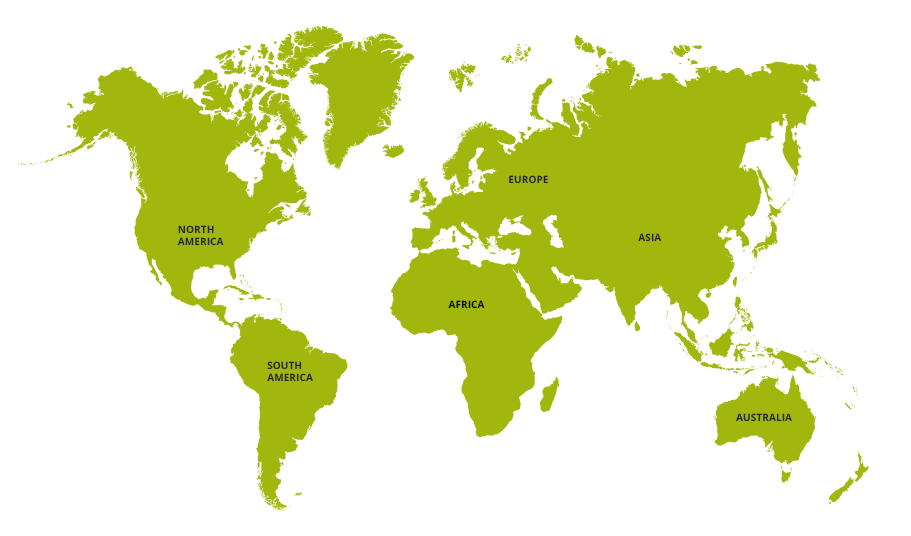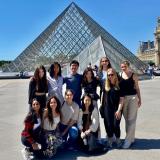Duke Pratt in Costa Rica
A 6-WEEK SUMMER ENGINEERING PROGRAM
Advance your engineering education while experiencing a new culture
Apply NowDuke Pratt in Costa Rica was developed in response to a growing number of students interested in studying abroad without compromising progress in their engineering studies. Based in San José, this program focuses on fundamental concepts in engineering, while introducing you to social, cultural, and environmental issues in Costa Rica.
Situated on a plateau in the Central Valley, the city of San José is surrounded by verdant mountains and valleys. As the seat of national government for the country, as well as its center of economic activity and cultural capital, San José is known for its lively urban pace, museums, cultural venues, and markets.
PROGRAM FAST FACTS
Location: San José, Costa Rica
Term: Summer II
Dates: July 1, 2025 - August 12, 2025
Application Deadline: February 1
Academic Theme(s): Engineering, Math
Credit Type: Duke Credit
Eligibility: See course descriptions for prerequisites. Non-Duke students are welcome to apply.
Duke Affiliation: Co-sponsored by the Pratt School of Engineering
Housing: Homestay
Primary Contact: Elizabeth Bucholz
ACADEMICS
You'll enroll in one engineering-related course, plus one required language and culture course, for a total of two credits. No pass/fail option or auditing is permitted.
Engineering Course
MATH 353A
Ordinary and Partial Differential Equations
(QS) 1.0 Credit
Prerequisite: Mathematics 216. Not open to students who have had Mathematics 356.
First and second order ordinary differential equations with applications, Laplace transforms, series solutions and qualitative behavior, Fourier series, partial differential equations, boundary value problems, Sturm-Liouville theory. Intended primarily for engineering and science students.
CHEM 210
Modern Applications of Chemical Principles
(NS) 1.0 Credit
Modern applications of chemistry in context of larger scientific theme, e.g. in biology, materials science, or environmental chemistry. Revisits core concepts from Chemistry 101DL or 110DL, incorporating additional topics including intermolecular interactions, phases of matter, solutions, quantitative treatment of aqueous equilibria, electron transfer reactions, and inorganic and coordination chemistry. Laboratory illustrates experimental approaches to modern problems in biological, materials, and environmental chemistry, as well as analytical and synthetic techniques.
Recommended prerequisite: Chemistry 101DL or 110DL.
Language & Culture Course
All students will enroll in the following required course:
SPANISH 92A
Culture and Language in Costa Rica
(CZ), 1.0 Credit
Prerequisite: None
This course is intended for students that have a basic to intermediate background of the Spanish language. The chief goals are to expand vocabulary and conversational skills, strengthen grammar, and introduce key social, cultural, and environmental issues in Costa Rica. Students will be placed in a section appropriate for their language level.
EXCURSIONS
There are several planned trips and excursions:
Explore the city of San José: We'll explore the city as part of cultural and lab activities, including visits to the Pre-Columbian history museum and market, a concert at the 'Venetian' theatre, and 'The Castle' (former seat of government).
The volcanoes of Costa Rica: We'll visit volcanos like Poas and Irazu to record seismic activity.
Other trips can include a visit to the annual virgin Mary pilgrimage, a tour of a hydro-electric dam, and a visit to the Costa Rica Space Agency. These excursions are led by Spanish-speaking guides and emphasize the use and cultural context of the language.
Cultural Activities
Each day from 4-5 pm, you can choose to participate in a cultural activity such as cooking, dance, or conversation practice – all taught in Spanish.
HOUSING & MEALS
You will be lodged in carefully selected homestays for the duration for the program.
Homestay families will provide two meals per day (breakfast and dinner).
COSTS
These costs are estimated based on previous years’ programs and the current exchange rate. All costs are subject to change.
Summer 2025
| Duke Students | Non-Duke Students | |
|---|---|---|
| Tuition | $TBD | $TBD |
| Program Fee | $TBD | $TBD |
| Transcript Fee | N/A | $120 |
| Other Costs | TBD | TBD |
| TOTAL (Estimated): | $TBD | $TBD |
Explanation of Costs
The program fee for this program includes:
- Accommodations
- Most meals (breakfast and dinner with host family)
- International SOS coverage
- Program-sponsored activities and excursions
- Orientation program
- Internet usage at the CRLA
- Laundry
- Some local transportation
What is not included?
Use the following list to assist with budgeting for expenses outside the program fee. This list contains common examples but should not be considered exhaustive.
- Airfare
- Lunch while in San José
- On-site accident and health insurance policy
- Out-of-pocket medical expenses
- Visa (if needed)
- Passport
- Textbooks and class materials
- Independent travel and entertainment
- Items of a personal nature
- Incidentals
U.S. citizens do not need a visa for this program. However, if you are not a U.S. citizen, you may need a visa. Please be sure to research the cost of obtaining a visa for Costa Rica, including any required travel to a consulate or embassy.
If you receive financial aid, and need assistance with travel costs, please contact your financial aid counselor.
Personal expenses can fluctuate greatly depending upon habits and preferences of the individual. It’s also wise to budget for unexpected expenses such as medical emergencies. You can use a cost-of-living comparison tool to get an idea of what daily life costs in the program host location.
Step 1: Upon acceptance to the program, you must submit the Summer Participation Agreement found in your MyGlobalEd application to confirm your enrollment. A parent/guardian’s co-signature is required. This form takes the place of a deposit.
NOTE: If you withdraw after March 15, you will be charged a cancellation fee for voluntary withdrawal. Fees range from $1,500-2,000.
Step 2: Summer invoices will be sent via email to your Duke email address and home email address. Remit payment to the Bursar per due date and address indicated on your online statement. Consult the Duke Bursar's office billing schedule for payment due dates.
Financial Aid
Duke students receiving institutional need-based grant aid are eligible for aid for this program; work-study funds are converted to grants. Students are individually responsible for making the necessary arrangements with the Karsh Office of Undergraduate Financial Support and the Duke Bursar’s Office.
Non-Duke students are not eligible to receive financial aid at Duke and should contact their home institutions for financial aid information.
Scholarships
This program offers the following scholarship opportunities:
DATES
Attendance is required at all classes, excursions, and group events. Given the intense nature of this program, late arrival and/or early departure is not permitted.
- Arrival: July 1, 2025
- Departure: August 12, 2025
Flights
You will make your own travel arrangements to and from the program site. You are expected to arrive on the arrival date cited above. Once you have a flight itinerary, log in to MyGlobalEd to update your travel registry.
Housing Before/After
You will need to make your own housing arrangements if you will be arriving before the program start date or leaving later than the program end date.
Schedule
All classes will be held at the Costa Rica Language Academy (CRLA). You'll take the language culture course the first part of the day and attend your chosen engineering-related course in the afternoon.
VISA & PASSPORT
VISA
No visa is required of U.S. citizens to participate in this program. However, you must have proof of a return ticket in order to enter Costa Rica. Non U.S. citizens should check visa requirements for their specific citizenship by contacting the Costa Rican embassy to find out if any visa requirements or restrictions are in effect.
PASSPORT
All participants must have a valid passport. Make sure your passport has at least six months of validity beyond the program end date to avoid unintended disruptions. For instructions on obtaining or renewing your U.S. passport, visit passports.state.gov.
International Student Identity Card
An International Student Identity Card (ISIC) is optional. ISIC is the only internationally recognized form of student ID, endorsed by UNESCO. If purchased in the U.S., the card also carries with it a supplemental insurance policy, which can prove to be very helpful in the event of serious injury. You may purchase this card through www.myisic.com. Processing of the card takes between 4-15 days.
Program Faculty & Staff
Program faculty director(s) can assist with questions related to program academics, admissions, on-site needs, etc. For all other inquiries, please contact the GEO representative listed.



ADMISSIONS
Deadline: February 1
This program has rolling admission. Applications will be considered on a first-come, first-served basis until the program fills; after that, qualified students are added to a waitlist and notified of openings. Applications must be received by the deadline to be considered. Application opens November 1. Applicants are encouraged to apply early, as this is a very popular program.
Eligibility: See Academics section above for course prerequisites.
Priority: Priority is given to applicants who apply early and meet the prerequisites.
Minimum GPA: There is no minimum GPA.
Non-Duke students: Non-Duke students are welcome to apply for this program. You must be a degree-seeking student in good standing at an accredited college or university. Consult your university’s registrar and/or study away advisor for assistance with transfer credit. Students who are not matriculated at a college or university are not eligible to participate in Duke’s study away programs.
GEO policy for graduating seniors who wish to apply for a Duke summer study abroad/away program:
Students must be active, matriculated students in order to participate in any Duke-in summer programs, including Duke’s domestic summer programs. All program courses must be taken for graded credit. If seniors plan to graduate in May of the year they plan to study abroad in the summer, they will not be eligible to participate on any of our summer programs unless they receive approval from their academic dean at Duke to delay their graduation until after the summer program has ended.
Non-Duke students planning to graduate in May in the year they plan to study abroad in the summer must provide approval to delay their graduation until after the summer program has ended from the appropriate official at their home institution. Such approval must be furnished in writing to GEO before the student will be allowed to participate in the summer program. This approval may be sent via email to the appropriate program assistant at GEO.
Duke students who defer their graduation to participate in study abroad should consult with their financial aid advisor in the Duke Office of Undergraduate Financial Aid to determine whether they are eligible for a summer aid package and/or a GEO summer scholarship.v
APPLY
Start your application early to ensure that it is complete by the deadline! Incomplete applications will not be forwarded to the program directors for consideration.
Submit the following items using MyGlobalEd:
- Online application.
- Transcript(s) from all colleges and universities attended. First-year students should wait for fall semester grades to be posted before submitting their transcript.
- Personal statement, no longer than one page, explaining why you would like to participate and what you hope to gain from it.





